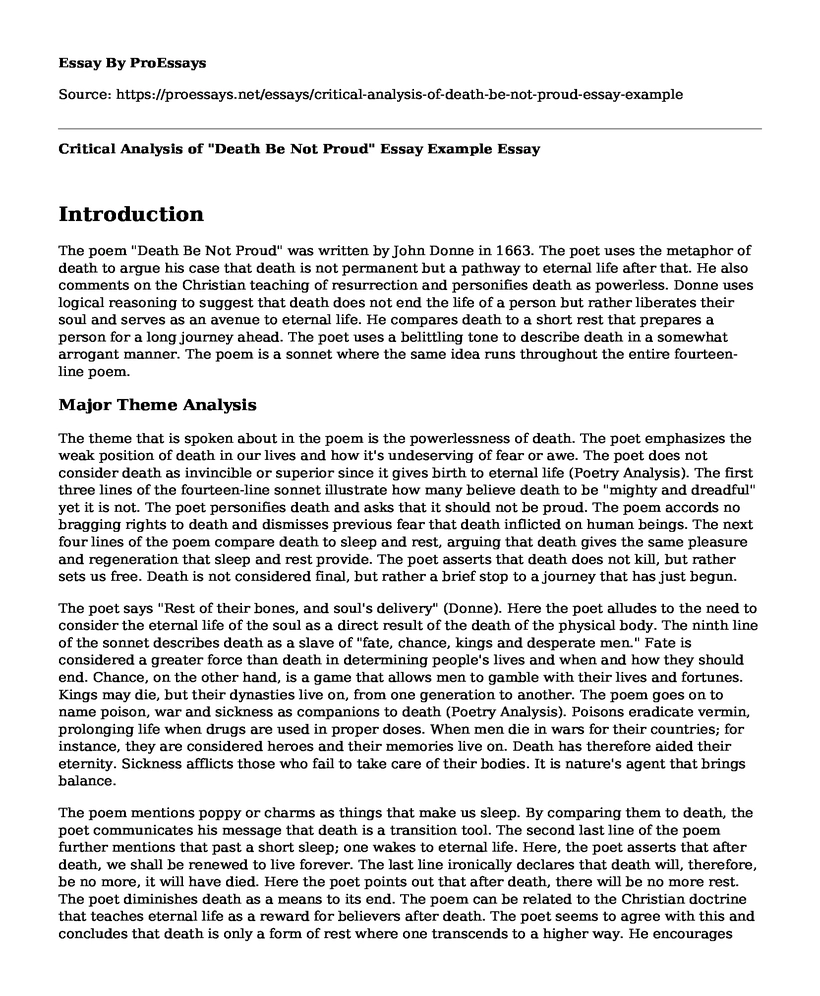Introduction
The poem "Death Be Not Proud" was written by John Donne in 1663. The poet uses the metaphor of death to argue his case that death is not permanent but a pathway to eternal life after that. He also comments on the Christian teaching of resurrection and personifies death as powerless. Donne uses logical reasoning to suggest that death does not end the life of a person but rather liberates their soul and serves as an avenue to eternal life. He compares death to a short rest that prepares a person for a long journey ahead. The poet uses a belittling tone to describe death in a somewhat arrogant manner. The poem is a sonnet where the same idea runs throughout the entire fourteen-line poem.
Major Theme Analysis
The theme that is spoken about in the poem is the powerlessness of death. The poet emphasizes the weak position of death in our lives and how it's undeserving of fear or awe. The poet does not consider death as invincible or superior since it gives birth to eternal life (Poetry Analysis). The first three lines of the fourteen-line sonnet illustrate how many believe death to be "mighty and dreadful" yet it is not. The poet personifies death and asks that it should not be proud. The poem accords no bragging rights to death and dismisses previous fear that death inflicted on human beings. The next four lines of the poem compare death to sleep and rest, arguing that death gives the same pleasure and regeneration that sleep and rest provide. The poet asserts that death does not kill, but rather sets us free. Death is not considered final, but rather a brief stop to a journey that has just begun.
The poet says "Rest of their bones, and soul's delivery" (Donne). Here the poet alludes to the need to consider the eternal life of the soul as a direct result of the death of the physical body. The ninth line of the sonnet describes death as a slave of "fate, chance, kings and desperate men." Fate is considered a greater force than death in determining people's lives and when and how they should end. Chance, on the other hand, is a game that allows men to gamble with their lives and fortunes. Kings may die, but their dynasties live on, from one generation to another. The poem goes on to name poison, war and sickness as companions to death (Poetry Analysis). Poisons eradicate vermin, prolonging life when drugs are used in proper doses. When men die in wars for their countries; for instance, they are considered heroes and their memories live on. Death has therefore aided their eternity. Sickness afflicts those who fail to take care of their bodies. It is nature's agent that brings balance.
The poem mentions poppy or charms as things that make us sleep. By comparing them to death, the poet communicates his message that death is a transition tool. The second last line of the poem further mentions that past a short sleep; one wakes to eternal life. Here, the poet asserts that after death, we shall be renewed to live forever. The last line ironically declares that death will, therefore, be no more, it will have died. Here the poet points out that after death, there will be no more rest. The poet diminishes death as a means to its end. The poem can be related to the Christian doctrine that teaches eternal life as a reward for believers after death. The poet seems to agree with this and concludes that death is only a form of rest where one transcends to a higher way. He encourages people to refuse to fear death.
Works Cited
Donne, John, and Fleur Adcock. 'Death Be Not Proud'. ProQuest LLC, 2004.
"Poetry Analysis: 'Death Be Not Proud' by John Donne." Society of Classical Poets, 6 Mar. 2018, www.classicalpoets.org/2013/01/31/poetry-analysis-death-be-not-proud-by-john-donne/ Accessed 12 May 2019.
Cite this page
Critical Analysis of "Death Be Not Proud" Essay Example. (2022, Dec 08). Retrieved from https://proessays.net/essays/critical-analysis-of-death-be-not-proud-essay-example
If you are the original author of this essay and no longer wish to have it published on the ProEssays website, please click below to request its removal:
- Lost City Of Atlantis
- Cross a Bridge when You Come to It
- A Haunted House by Virginia Woolf Essay
- Similarities of Beowulf, Hamlet, Things Fall Apart, and The Things They Carried
- Essay Sample on Victor & Henry: Closest Friends in Mary Shelley's Frankenstein
- Essay Example on Death's Bitter Grip: Emily Dickinson's Immortality
- A Good Man: O'Connor's Dynamic Reader-Author Assault Essay







